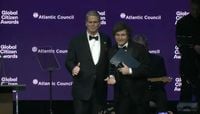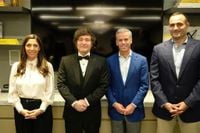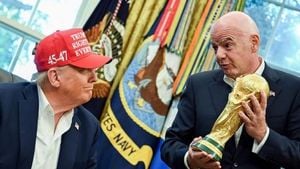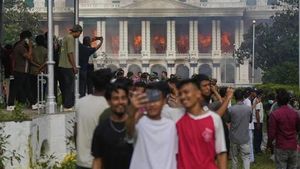On September 24, 2025, the spotlight in Manhattan shone brightly on Argentine President Javier Milei, who was honored with the prestigious “Ciudadano Global 2025” award at the Atlantic Council’s annual gala. The event, held as part of the United Nations General Assembly week, brought together more than 600 global leaders, diplomats, and top executives in a celebration of international cooperation and the ideals of global citizenship, according to Infobae.
The award itself was presented by Scott Bessent, the U.S. Treasury Secretary, who has been instrumental in orchestrating a fresh wave of financial assistance to Argentina. The timing of the accolade and the high-profile company at the event—French President Emmanuel Macron, Blackrock CEO Laurence D. Fink, FIFA President Gianni Infantino, and the new U.S. Ambassador to Argentina Peter Lamelas, to name a few—underscored the significance of Milei’s growing influence on the world stage and the renewed focus on Argentina’s economic recovery.
In his acceptance speech, President Milei did not mince words about the magnitude of the moment. “This is a historic milestone that will surely bring benefit to both parties and to the entire American continent,” he declared, as reported by Infobae. His remarks were aimed not just at his international peers, but directly at the Argentine people. “For the restoration of public finances, we have taken measures that may seem unpopular. With courage, effort, and patience, Argentines are supporting us. We know we are on the right path,” Milei said, emphasizing a sense of national purpose amid economic turbulence.
Milei’s speech also included a pointed acknowledgment of the support from former U.S. President Donald Trump, whose financial backing has played a role in calming markets and reducing Argentina’s country risk. “Doing the right thing, no matter how uncomfortable, is what made nations great. That is something my friend Donald Trump has decided to support,” Milei stated, referencing Trump’s endorsement and the broader message of tough reforms over populist comfort.
He didn’t shy away from addressing domestic critics either. “Today, Argentina has a sustained fiscal surplus for the first time in 123 years. The opposition has attacked our administration because they know the time to destroy us is now,” he told the audience, highlighting both the magnitude of the fiscal achievement and the fierce political climate back home.
The Atlantic Council’s Global Citizen Awards have become a magnet for world leaders and influential figures from philanthropy, business, and entertainment. The 2025 edition, set to a jazz soundtrack in a packed Manhattan ballroom, was no exception. According to BBC and Infobae, the event’s guest list included not only heads of state and CEOs but also Argentina’s own officials: Economy Minister Luis Caputo, Presidential Secretary Karina Milei, Ambassador Alejandro Oxenford, and Foreign Minister Gerardo Werthein.
But the gala was only one part of Milei’s packed New York agenda. Earlier that day, he met with a trio of influential business and political leaders: Michael P. Lyons, who took the helm as CEO of Fiserv in May 2025; Matthew Dell Orfano, executive at the international investment fund Discovery Capital; and Soledad Cedro, CEO of CPAC Argentina. Cedro, in particular, has emerged as a vital link between conservative political circles in the United States and Latin America, according to Diario Mendoza.
These meetings, confirmed by official sources and widely reported by Argentine and international media, signaled Milei’s drive to attract global fintech firms and investment funds to Argentina. The presence of Lyons, Dell Orfano, and Cedro at such a high-level moment reflected an explicit strategy: to position Argentina as a destination for international capital and innovation, especially in the financial technology sector.
As reported by Diario Mendoza, Lyons’ recent appointment as CEO of Fiserv, a global leader in financial services and payment solutions, brought additional weight to the conversation. The government’s outreach to companies like Fiserv underscores its intention to deepen ties with the global fintech sector. Meanwhile, Discovery Capital’s international reach and Cedro’s network-building between hemispheres highlighted Argentina’s efforts to bridge political and economic divides for mutual benefit.
The Atlantic Council’s gala, of course, was not just about awards and networking. It was a platform for Milei to articulate his vision for Argentina’s place in the world. In his remarks at the United Nations General Assembly, delivered just hours before the gala, Milei offered a forceful defense of fiscal discipline, market freedoms, and national sovereignty. “We will never support the curtailment of individual or commercial freedoms, nor the violation of the natural rights of the citizens of member states; and over the past year and a half, we have voted accordingly,” he said, according to Infobae.
He criticized the UN for drifting from its founding mission, stating, “We believe in the original purpose of this organization.” Milei insisted that “progress is never linear” and argued that “without investment, there can be no growth.” He drove home the point that “it is better to tell an uncomfortable truth than a comfortable lie,” a refrain that echoed throughout his speeches in New York.
On the economic front, Milei drew a sharp contrast with past Argentine policies. “Argentina is doing the opposite of what it did before,” he asserted, describing the current trajectory as “the right path, even if it is the hardest.” He praised Trump’s efforts to “reverse a dynamic that was leading the United States to catastrophe,” citing the former president’s tough stance on illegal immigration and unprecedented restructuring of international trade terms.
Milei found common ground between Argentina and the U.S. in their shared focus on the future. “Recovering an interest in the future and not succumbing to the temptation to only address the present,” he said, is a challenge for both nations. He also lamented the tendency among some leaders to “burn the future to keep the present warm,” a vivid metaphor for short-termism in politics.
In his address, Milei championed the sanctity of property rights and the free market—“because without property rights, there is no saving; without saving or the ability to exchange it freely, there is no investment; and without investment, there is no possible growth.” He warned, however, that “it is not in the individual interest of the politician to respect these principles, because it is precisely in the enlargement of the state, at the expense of citizens’ freedoms, that the politician gains power.”
He concluded his United Nations speech with a reiteration of Argentina’s “legitimate and non-negotiable claim” over the Malvinas, South Georgia, South Sandwich Islands, and surrounding maritime spaces, which remain under British control. He also called for the release of those still detained in Gaza, signaling Argentina’s engagement with broader international issues.
The events of September 24, 2025, in New York marked a turning point for President Javier Milei and Argentina’s efforts to reassert itself on the global stage. Through high-level meetings, public addresses, and international recognition, Milei sought to chart a new course for his country—one rooted in fiscal responsibility, open markets, and renewed global partnerships.





